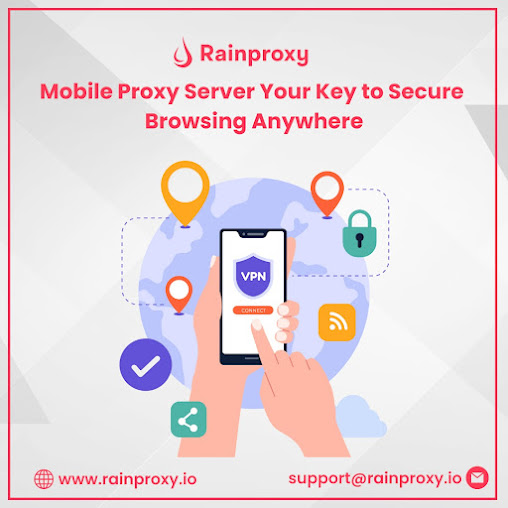A Guide To Understand Residential Proxies, Residential IPs, and Rotating Datacenter Proxies
The use of proxies has become a crucial tool for individuals and businesses alike. Among the myriad of proxy services available, residential proxies, residential IPs, and rotating datacenter proxies have emerged as key players in the quest for a seamless and secure online experience. All you need to do is get in touch with a reliable Residential Proxy Provider for the best solutions.
Residential Proxies
At the forefront of the proxy revolution are residential proxies, which have gained popularity for their unique approach to masking one's identity online. Unlike traditional data center proxies, which originate from servers hosted in data centers, residential proxies borrow their IP addresses from real residential devices.
The primary advantage of Residential IP lies in its ability to mimic genuine user behavior. By utilizing IP addresses from a Residential Proxy Provider associated with actual residential locations, users can access websites without triggering suspicion. This makes residential proxies indispensable for web scraping, ad verification, and accessing geo-restricted content.
Residential proxies provide a level of trustworthiness that traditional proxies often lack. Websites and online platforms are less likely to flag residential IP addresses, enhancing the chances of successful and undetected browsing. This aspect makes them particularly valuable for businesses engaged in competitive intelligence, market research, and brand protection.
The Essence of Residential IPs
A subset of residential proxies is Residential IPs, which are essentially IP addresses assigned to residential connections. Residential IPs offer the same advantages as residential proxies but with a more direct focus on the IP aspect of the equation.
The key advantage of residential IPs lies in their association with legitimate, non-suspect entities—real households. This association fosters a higher level of trust in online services and platforms. For instance, when using a residential IP, accessing online banking services or making secure transactions is less likely to raise red flags.
Moreover, residential IPs from a Residential Proxy Provider are highly sought after for their ability to bypass geographical restrictions. Streaming platforms, for instance, often restrict content based on the user's location. By employing a residential IP address, users can circumvent these restrictions and access a wider array of content, as the IP appears to be originating from a genuine residential location.
Decoding Rotating Datacenter Proxies
On the other end of the spectrum, Rotating Datacenter Proxies bring a different flavor to the proxy game. While not as tied to genuine residential locations, rotating datacenter proxies offer a unique advantage: dynamic IP rotation.
Rotating datacenter proxies, as the name suggests, involve a constant cycling of IP addresses. This dynamic rotation can occur at predetermined intervals or in response to specific triggers, ensuring a constantly changing digital fingerprint. This feature is particularly advantageous for web scraping and data mining, as it helps prevent IP bans and enhances anonymity.
The dynamic nature of Rotating Datacenter Proxies makes them a valuable tool for businesses engaged in high-frequency data extraction or those dealing with large-scale web scraping projects. By avoiding the risk of being blacklisted due to repetitive requests from a single IP address, users can maintain uninterrupted access to target websites.
Choosing the Right Proxy for Your Needs
Selecting the right proxy solution depends on the specific requirements of the user or business. Residential proxies and residential IPs are ideal for tasks where authenticity and trust are paramount, such as ad verification, market research, and geo-restricted content access. Their ability to copy real user behavior and bypass restrictions makes them a reliable choice for many scenarios.
On the other hand, rotating datacenter proxies shine in high-volume data extraction operations. Their dynamic IP rotation capability minimizes the risk of being detected and blocked, ensuring a seamless flow of data without interruptions.
The Legal and Ethical Landscape
While proxies offer invaluable benefits, it's crucial to navigate the legal and ethical landscape surrounding their use. Misuse of proxies for illegal activities, such as hacking, fraud, or unauthorized access, can lead to severe consequences. Users and businesses should adhere to the terms of service of a Residential Proxy Provider and ensure their activities are within legal and ethical bounds.
Conclusion
As technology continues to advance, the landscape of proxy services is likely to evolve as well. The demand for more sophisticated and secure solutions will drive innovation in the field. Whether it's refining the capabilities of residential proxies, enhancing the dynamic Rotating Datacenter Proxies, or developing entirely new technologies, the proxy industry is bound to remain a critical player in the digital realm.
The world of residential proxies, residential IPs, and rotating datacenter proxies is a dynamic and multifaceted one. Each type of proxy from a Residential Proxy Provider brings its own set of advantages to the table, catering to the diverse needs of individuals and businesses navigating the complexities of the internet. As online privacy and security continue to be at the forefront of our digital experience, the role of proxies from Rainproxy in shaping a secure and seamless online landscape is set to become even more pronounced.

%20(1).jpg)


Comments
Post a Comment